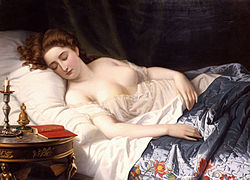
Imogen (also spelled Innogen) is the daughter of King Cymbeline in Shakespeare's play Cymbeline . She was described by William Hazlitt as "perhaps the most tender and the most artless" of all Shakespeare's women. [1]

Imogen (also spelled Innogen) is the daughter of King Cymbeline in Shakespeare's play Cymbeline . She was described by William Hazlitt as "perhaps the most tender and the most artless" of all Shakespeare's women. [1]
Academic consensus suggests that Shakespeare named the character Innogen, and the spelling "Imogen" is an error which arose when the manuscripts were first committed to print. Shakespeare probably took the name from the Matter of Britain character Innogen as found in Holinshed's Chronicles (1577), and had used the name once before for a non-speaking 'ghost character' in early editions of Much Ado About Nothing (1600), as the wife of the character Leonato (Imogen in Cymbeline is paired with a character with the similar epithet "Leonatus"). An early description of Cymbeline by Simon Forman in 1611 consistently spells Imogen's name as "Innogen", leading scholars to conclude that the spelling of the character's name as "Imogen" in the 1623 First Folio appears to have been a result of "scribal or compositorial error". [2] As a result, some modern editions of Shakespeare's plays, notably the 1986 Oxford Edition, correct the name to Innogen. [3]

Imogen is princess of Britain, and the virtuous wife of the exiled Posthumus, whose praise of her moral purity incites Posthumus's acquaintance Iachimo to bet Posthumus that he can seduce her. When he fails, Iachimo hides in her bedchamber and uncovers her body while she sleeps, observing details of a mole on her breast which he then describes to Posthumus as proof that he had slept with her. Posthumus plots to kill his wife, but the designated killer reveals the plot to Imogen and advises her to hide; she escapes to the woods dressed as a man and falls in with a family who helps her. Taking a drug, she falls into a coma and is presumed dead by the family, who cover her body and sing a song over her. When she wakes she finds the headless body of Cloten, a brutish character who had planned to rape her while wearing Posthumus's clothes, but had been killed in a fight with one of the men who took her in. She mistakes the headless body for that of her husband. After the battle at the climax of the play she confronts Iachimo who confesses his lies. She is reunited with Posthumus, and her father (King Cymbeline), and discovers two of the men who took her in are actually her long lost brothers.
Oscar Wilde alludes to Imogen in The Picture of Dorian Gray when Dorian describes Sibyl Vane, the actress he is infatuated with.
'It must be, if you say it. And now I am off. Imogen is waiting for me. Don't forget about tomorrow. Good-bye.'(Ch. IV)
Stephen Dedalus alludes to Imogen in Ulysses , referring to the episode in which Iachomo observes the mole on her breast: "Ravisher and ravished, what he would, but would not, go with him from Lucrece's bluecircled ivory globes to Imogen's breast, bare, with its mole cinquespotted."
E. M. Forster alludes to Imogen in Where Angels Fear to Tread when describing Lilia's sadness in her marriage: "Not Cordelia nor Imogen more deserves our tears."
A character in Anthony Trollope's Barchester Towers mentions Imogen: "Imogen was true, but how was she rewarded? Her lord believed her to be the paramour of the first he who came near her in his absence."
John Keats, a great admirer of Shakespeare, in a famous letter to Richard Woodhouse, contrasts Imogen to one of Shakespeare's most notoriously immoral characters, Iago, in order to describe the character of the poet: "The poetical character has no self—it is everything and nothing—it has no character and enjoys light and shade; it lives in gusto, be it foul or fair, high or low, rich or poor, mean or elevated—it has as much delight in conceiving an Iago as an Imogen. What shocks the virtuous philosopher delights the chameleon poet... A poet is the most unpoetical of anything in existence because he has no identity, he is continually filling some other body."
Imogen is also alluded to in Nathaniel Hawthorne's short story "The Antique Ring": "Or, who knows, but it is the very ring which Posthumus received from Imogen?"
In George Bernard Shaw's rewrite of the last act of Cymbeline, Cymbeline Refinished , Imogen becomes a much more assertive figure in line with Shaw's feminist views. She continually questions both Iachimo and Postumus at the end, refusing to forgive them before finally saying that she will "go home and make the best of it, as other women must". [4]
In the Disney+ TV series The Veil (2024), the main character played by Elisabeth Moss, a secret agent keen on Shakespeare’s work, names herself Imogen for the time of her mission.

The Tragedy of Othello, the Moor of Venice, often shortened to Othello, is a tragedy written by William Shakespeare around 1603. Set in Venice and Cyprus, the play depicts the Moorish military commander Othello as he is manipulated by his ensign, Iago, into suspecting his wife Desdemona of infidelity. Othello is widely considered one of Shakespeare's greatest works and is usually classified among his major tragedies alongside Macbeth, King Lear, and Hamlet. Unpublished in the author's life, the play survives in one quarto edition from 1622 and in the First Folio.

Cymbeline, also known as The Tragedie of Cymbeline or Cymbeline, King of Britain, is a play by William Shakespeare set in Ancient Britain and based on legends that formed part of the Matter of Britain concerning the early historical Celtic British King Cunobeline. Although it is listed as a tragedy in the First Folio, modern critics often classify Cymbeline as a romance or even a comedy. Like Othello and The Winter's Tale, it deals with the themes of innocence and jealousy. While the precise date of composition remains unknown, the play was certainly produced as early as 1611.
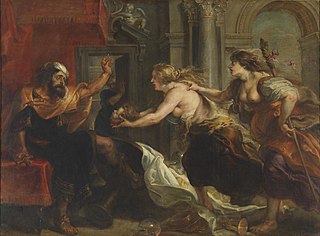
In Greek mythology, Tereus was a Thracian king, the son of Ares and the naiad Bistonis. He was the brother of Dryas. Tereus was the husband of the Athenian princess Procne and the father of Itys.
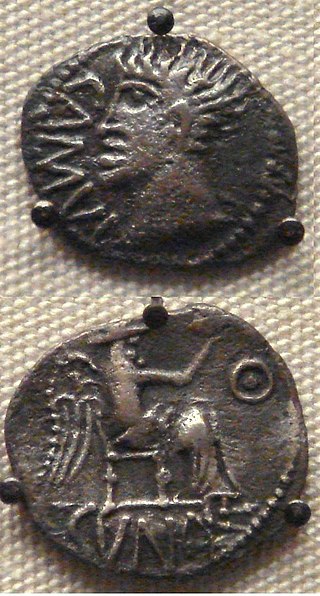
Cunobeline or Cunobelin, also known by his name's Latin form Cunobelinus, was a king in pre-Roman Britain from about AD 9 to about AD 40. He is mentioned in passing by the classical historians Suetonius and Dio Cassius, and many coins bearing his inscription have been found. He controlled a substantial portion of south-eastern Britain, including the territories of the Catuvellauni and the Trinovantes, and is called "King of the Britons" by Suetonius. Cunobeline may have been a client king of Rome, based on the images and legends appearing on his coins. Cunobeline appears in British legend as Cynfelyn (Welsh), Kymbelinus or Cymbeline, as in the play by William Shakespeare.

The Rape of Lucrece (1594) is a narrative poem by William Shakespeare about the legendary Roman noblewoman Lucretia. In his previous narrative poem, Venus and Adonis (1593), Shakespeare had included a dedicatory letter to his patron, the Earl of Southampton, in which he promised to compose a "graver labour". Accordingly, The Rape of Lucrece has a serious tone throughout.
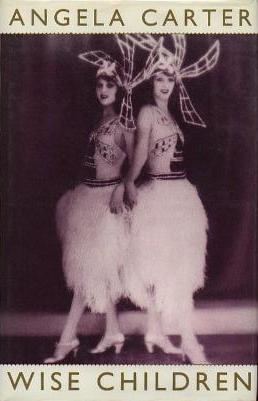
Wise Children (1991) was the last novel written by Angela Carter. The novel follows the fortunes of twin chorus girls, Dora and Nora Chance, and their bizarre theatrical family. It explores the subversive nature of fatherhood, the denying of which leads Nora and Dora to frivolous "illegitimate" lechery. The novel plays on Carter's admiration of Shakespeare and her love of fairy tales and the surreal, incorporating a large amount of magical realism and elements of the carnivalesque that probes and twists our expectations of reality and society.
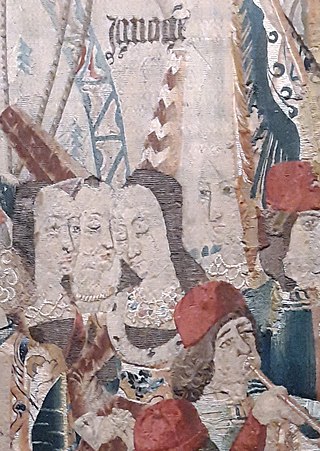
Innogen is a character in the Historia Regum Britanniae and subsequent medieval British pseudo-history. She was said to have been a Greek princess, the daughter of King Pandrasus, and to have become Britain's first Queen consort as the wife of Brutus of Troy, the purported first king of Britain who was said to have lived around the 12th century BC. Her sons Locrinus, Camber, and Albanactus went on to rule Loegria, Cambria, and Alba respectively.

The Boggart is a children's novel by Susan Cooper published in 1993 by Macmillan.The book was nominated for a Young Reader's Choice Award in 1996.

Sextus Tarquinius was one of the sons of the last king of Rome, Lucius Tarquinius Superbus. In the original account of the Tarquin dynasty presented by Fabius Pictor, he is the second son, between Titus and Arruns. However, according to Livy and Dionysius of Halicarnassus, he was either the third or first son, respectively. According to Roman tradition, his rape of Lucretia was the precipitating event in the overthrow of the monarchy and the establishment of the Roman Republic.
A ghost character, in the bibliographic or scholarly study of texts of dramatic literature, is a term for an inadvertent error committed by the playwright in the act of writing. It is a character who is mentioned as appearing on stage, but who does not do anything, and who seems to have no purpose. As Kristian Smidt put it, they are characters that are "introduced in stage directions or briefly mentioned in dialogue who have no speaking parts and do not otherwise manifest their presence". It is generally interpreted as an author's mistake, indicative of an unresolved revision to the text. If the character was intended to appear and say nothing, it is assumed this would be made clear in the playscript.

Richard Field (1561–1624) was a printer and publisher in Elizabethan London, best known for his close association with the poems of William Shakespeare, with whom he grew up in Stratford-upon-Avon.
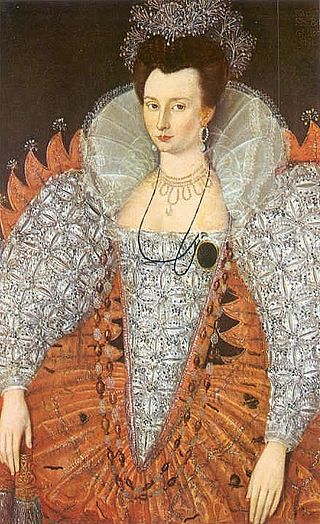
The Dark Lady of the Sonnets is a 1910 short comedy by George Bernard Shaw in which William Shakespeare, intending to meet the "Dark Lady", accidentally encounters Queen Elizabeth I and attempts to persuade her to create a national theatre. The play was written as part of a campaign to create a "Shakespeare National Theatre" by 1916.
Women in Shakespeare is a topic within the especially general discussion of Shakespeare's dramatic and poetic works. Main characters such as Dark Lady of the sonnets have elicited a substantial amount of criticism, which received added impetus during the second-wave feminism of the 1960s. A considerable number of book-length studies and academic articles investigate the topic, and several moons of Uranus are named after women in Shakespeare.

Cymbeline is a 2014 American crime thriller film written, produced, and directed by Michael Almereyda, based on the play of the same name by William Shakespeare. The film stars Ethan Hawke, Ed Harris, Milla Jovovich, John Leguizamo, and Dakota Johnson.
Walter Montgomery (1827–1871) was an American-born British actor, real name Richard Tomlinson.
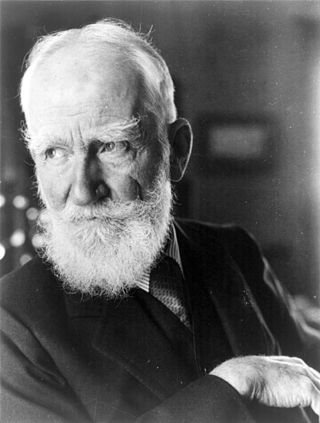
Cymbeline Refinished (1937) is a play-fragment by George Bernard Shaw in which he writes a new final act to Shakespeare's play Cymbeline. The drama follows from Shaw's longstanding need to reimagine Shakespeare's work, epitomised by his play Caesar and Cleopatra and his late squib Shakes versus Shav.
Imogen Says Nothing: The Annotated Life of Imogen of Messina, last sighted in the First Folio of William Shakespeare's Much Adoe About Nothing is a three-act play by Aditi Brennan Kapil inspired by a ghost character in Shakespeare's Much Ado About Nothing. The play premiered on January 20, 2017 at the Yale Repertory Theatre.
This article incorporates text from a publication now in the public domain : Wood, James, ed. (1907). The Nuttall Encyclopædia . London and New York: Frederick Warne.{{cite encyclopedia}}: Missing or empty |title= (help)